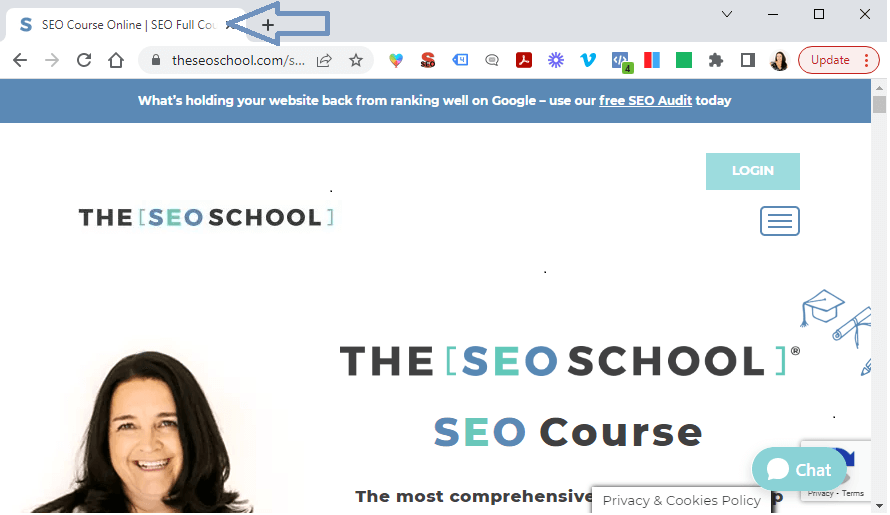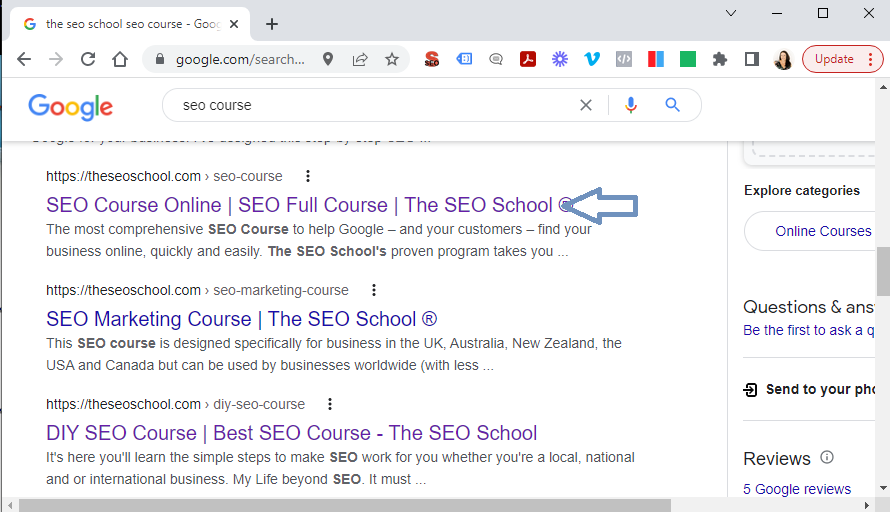SEO Mini-Course
Get Started On Your SEO Journey


Have you noticed some of your title tags are different to the ones you wrote?
Well, unless your SEO page titles have matched up to Google’s expectations, you’ll probably find some of them will have been changed to meet the search engine’s new requirements.
In fact, a recent research report showed that Google has rewritten over 60% of titles, so it’s highly likely some of your tags will have been affected. The study from Zyppy.com analysed close to 90 000 title tags across 2370 sites around the world and found that Google rewrote 61.6% of the titles.
If you open up your website and look at the top of your browser bar, you can see your title tag here in the tab. In many content management systems this is often called an SEO Title. This is where you can add the keywords you would like to rank for.

On the Google Search Results, you can see your title tag here. You would need to search for your business name or different keywords you rank for to see what comes up for your website.

In 2021, Google announced that they were going to make changes to the titles that it shows in its search results in order to improve the descriptions of the page. Its system had determined that many pages didn’t even have titles and some were badly constructed or misleading.
Google had always made adjustments to titles, but these had generally been minor. Following the update, there was a flurry of activity by the search engine giant but it now claims that original title tags are now being used around 87% of the time, up from 80% a short while ago.
Google’s stated intention is to make information universally accessible and useful – and it’s constantly investigating ways of improving the user’s search experience. While you might have spent hours crafting what you think are perfect title tags, if they don’t fit into what Google thinks is best, you’ll find adjustments have been made.
But if the outcome is an improved title tag which gives searchers the best information about a page, it’s a win for them and it’s a win for website owners. In a perfect world, Google’s rewrite should actually increase your chances of a click-through.
Several scenarios prompted the rewrites, including:
Google also encouraged people to focus on creating great HTML title elements as those were what they used the most. Zippy’s research confirmed this was the case and found that by matching the H1 to the title, the degree of rewriting was often dramatically reduced.
Some SEO experts say that the titles had been improved while others have been less impressed, calling for an ‘opt-out’ option. While I haven’t seen dramatic changes made to my clients’ tags, I do think it is important that industry leaders in the field of SEO continue to provide Google with feedback on the situation so that improvements can be made where necessary.
It’s not possible to stop Google from rewriting your tags, but there are things you can do to reduce the likelihood of it happening.
Any SEO specialist worth their salt knows that page titles have a considerable impact on click-through rates. Giving the user the right information to help them make a decision about whether a page is worth visiting is crucial, plus it’s important to do the right thing by Google.
My tips for writing for writing Google-friendly title tags are:
If you’re new to SEO, why not take a look at my FREE SEO Starter Kit, and if you’re keen to discover more tips and techniques for successful SEO? Check out The SEO School and find out how easy it is to learn SEO and ensure that your business gets found online. Book your spot on this self-managed modular course now or see the website for more details.
FREE Community
Are you frustrated customers can’t find your website?
Join my FREE online community for SEO tips!
seo Freebies
Are you the best kept secret on the internet?
It’s time to change all that with my DIY SEO freebies!
The SEO Course
Do you have a website that’s not performing? Learn SEO and put your website to work!
We talk about how technology and digital communications have literally put the whole world at our fingertips, but the reality is that we still love local. And that’s why we have to love local when it comes to SEO. Why does local SEO matter? Local SEO is important because the days of relying on a Yellow Pages
AI is on everyone’s lips. All the talk is about what AI can do and what it is going to be able to do. Some people even have it taking over the whole world, sending humans into a life of servitude to machines and computer systems. Should we fear the future? If you’re a content creator, here’s some good news. This
It’s no secret that SEO requires a multi-pronged approach in order to be effective. Some elements are simple and easy to implement while others require more technical expertise, but each one plays a role in great SEO. This article covers one of the most important elements of SEO…backlinks. Backlinks are links to
Then join my Facebook community…

If you’re looking for a supportive online group that share the same mission – to get found online – then this community is for you!
From SEO updates and tips to Ask Me Anything Fridays, this is your space to pick-my-brains.
